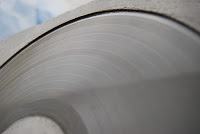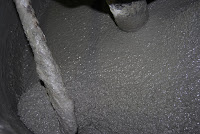 This is one of our learning modules for UHPC Concrete. A new version will be released this year. We use such modules for training purposes. New ones are added every year. This year there will be four new modules.
This is one of our learning modules for UHPC Concrete. A new version will be released this year. We use such modules for training purposes. New ones are added every year. This year there will be four new modules. - Cement, microsilica, superplastisizer
- Epoxy, microsilica, dispersant
- Cement, sand, epoxy
- Cement, sand, microsilica
- True
- False
- Only if pH is below 5
- Only if pH is above 5
- Only if pH is below 3
- True
- False
- Only if pH is above 12
- Only if pH is below 12
- Only if pH is above 13
- Quarz
- Bauxite
- Silicium carbide
- Titanium carbide
- Quarz, bauxite, corundum, silicium carbide
- Bauxite, quarz, corundum, silicium carbide
- Silicium carbide, bauxite, quarz, corundum
- Bauxite, corundum, quarz, silicium carbide
- Silicium carbide, corundum, bauxite, quarz
- 20°C / 68°F
- 10°C / 50°F
- 5°C / 41°F
- 0°C / 32°F
- - 5°C / 23°F
- The product cannot seggregate
- The product must remain dry
- There must be free water on top of the product in the mixer
- You cannot add too much water to UHPC
- Any mixing problem can be solved by adding more water
- I contact hhbc-consulting or to have a new bag
- I control the storage environment
- I discard the bag
- I check the date on the bag to see age of product
- No problem, I just add more water
- I wait a while to see if they mix out, if not I will add a little more water
- I throw away the mix
- I check if the mixer is proper prepared for mixing UHPC
- I increase the speed of the mixer
- No problem, Just need to use the product fast
- I allow the mixer to run for longer time, untill the free water is no longer there
- I will try to scoop out the free water
- I throw away the mix
- I add more powder untill the free water disappeares
- It is packing between cement particles, increasing density and displacing water
- It is like little ball bearings making the mortar more flowable
- It reacts with Ca(OH)2 from the cement hydration and create a denser material
- It has no significant effect, just a filler to make the product cheaper
- There is no microsilica in UHPC
- It makes the product more flexible
- It charges all particles so that they repell each other. At the same time it makes stearic hinderence so that particles cannot bridge build on each other, and in this way it displaces water.
- There is no superplasticizer in UHPC
- It is a polymer, added to make the product easier to mix
- It is lubricating the particles so that they can react better
- True
- False
- Sometimes if you are lucky
- Only during the weekend
- Only if you use a special throwel
- Up to 1200°C / 2192°F
- Not above 1000°C / 1832°F
- Not above 600°C / 1112°F
- Not above 400°C / 752°F
- Not above 200°C / 392°F
- Up to 1200°C / 2192°F
- Not above 1000°C / 1832°F
- Not above 600°C / 1112°F
- Not above 400°C / 752°F
- Not above 200°C / 392°F
- True
- False
- Only acid or alkalies
- Especially if there are salts present
- Only if temperature is above 100 deg C
- No problem, I just add more water
- I wait it out for a while to see if it wets through, and I adjust the water accordingly
- I throw away the mix
- I ignore it
- Cross my fingers and hope everything will be ok
- Nothing, you can add as much water as you like
- The product will most likely seggregate, but properties will in general be reduced in direct correlation with the amount of water added.
- Especially if we are working with a UHPC Cast product, installation will be a lot easier
- Strength will increase as we will hydrate more cement
- The stickyness of the product will increase a lot
- It is the same, no difference
- UHPC is stronger in terms of compressive strength
- UHPC is more dense
- Concrete is more flexible
- UHPC can be installed under water
- It i the same, no difference
- Refractory needs heat to finalize its reactions, UHPC does not
- UHPC is more wear resistant
- The insulation properties of UHPC is better than that of refractory
- UHPC can withstand higher temperatures compared to refractoriesWPE DK International
Phone: 0049 176 601 73146
E-mail: ber@wpe-dk.dk
Homepage: www.wpe-dk.com














































